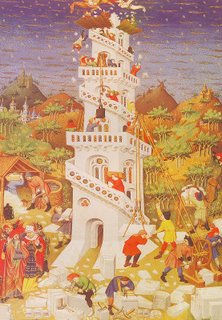 Germany is the most recent entrant into the
Germany is the most recent entrant into thePANIC ZONE
Achtung, Germans: Denglisch is here to stay
Interestingly, the article delves into the global Anglicization of languages:FRANKFURT (Reuters) - It is known as Denglisch, a hybrid of Deutsch and English, and cultural purists say it is an insult to the language of Goethe and should be purged from the vocabulary.
Denglisch has spread steadily as Germans adopted American phrases in business, advertising, technology, and everyday speech. "Brainstorm" has become as common a word in German as "surfen," "chatten," and "shoppen" (for surfing, chatting and shopping).
In Frankfurt, Germany's financial capital, "uptick" and "downturn" are familiar terms and posters listing evening entertainment are headlined "city nacht" (for night).
In Berlin, satirical theater calls itself quatschcomedyclub (quatsch means nonsense) and visitors to the foreign ministry can relax at "The Coffee Shop im Auswaertigen Amt."
"We are colonizing ourselves, voluntarily," complained the German Language Association, a 26,000-strong private group of self-appointed language guardians who want legal protection for the language.
The association has introduced an award for "language adulterer of the year" to shame public figures whom it deems guilty of showing insufficient respect for German.
The leading candidate for this year's prize, to be announced in late August, is Guenther Oettinger, premier of the state of Baden-Wuerttemberg.
His offense? Saying Germany should adopt English as its working language and use German at home and on holiday.
But then the article veers into obligatory America-bashing:Judging from attempts elsewhere to legislate the use of a national language, both English and Denglisch are in Germany to stay.
In 1994, France passed a law meant to suppress Franglais, Denglisch's French cousin. The legislation banned the use of foreign words in work contracts, public announcements, advertising and on radio and television. It said foreign words would have to be replaced by words approved by the Academie Francaise, which serves as watchdog for the French language. The law had little effect on the use of such words as "le weekend" or "le T-shirt" -- denounced as language contaminants by purists.Americanisms proved similarly resistant to legislation in Poland, where young people embraced English after the collapse of communism and decades of obligatory Russian studies.
"A language becomes an international language for one chief reason -- the political power of its people -- especially their military power," said British linguist David Crystal, whose book "English as a Global Language" is considered a landmark study.BOGUS!! That is such a load of crap. The language of COMMERCE is what becomes international, not military might. Armies may come and go, but money talks.
The internet has taken over the world, and English is what dominates the internet... particularly the commerce part.
The Francophones and the Deutsche Sprecheren and all the speakers of other beautiful languages (I mean that... I love listening and learning and speaking other languages) are just out of luck on this one... which is a shame, in some respects, because of this possibility:
Blech. I think that a language suffers when someone tries to engineer it forward. Let it develop... the result will be much more interesting and practical than when some know-it-all invents Esperanto II. We'll all use the words that spring up around the internet, and there will be dialects among internet neighborhoods (leet-speakers and the Pajamahadeen come to mind), but it'll happen on its own. Leave it alone.For those in search of shortcuts, there are rival proposals from India and France for simplified versions of English called Globish.
The Indian version, designed by retired engineer Madhukar Gogate, provides simplified spelling and pronunciation to make learning easier for people unfamiliar with Roman script.The other Globish is being promoted by a retired IBM executive with a flair for publicity, Jean-Paul Nerriere, whose French-language Web site touts his book "Don't Speak English, parlez Globish."
He proposes a 1,500-word version of English with elementary syntax as "the planetary dialect of the third millennium and integrated solution to the problem of international communication."
And don't stop speaking your own language with your actual neighbors. The more languages you speak, the better off you'll be.

No comments:
Post a Comment